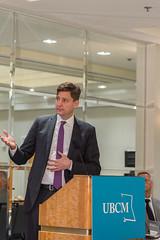 Having received two reports and launched a public inquiry, Finance Minister Carole James, Attorney General David Eby and an expert panel detailed the progress made and the challenges that remain in the provincial effort to rein in money laundering in a policy session today. Panelists explored how British Columbians are still coming to terms with how money laundering affects civil society and the ‘colossal failure’ of the regulatory system to deal with the problem.
Having received two reports and launched a public inquiry, Finance Minister Carole James, Attorney General David Eby and an expert panel detailed the progress made and the challenges that remain in the provincial effort to rein in money laundering in a policy session today. Panelists explored how British Columbians are still coming to terms with how money laundering affects civil society and the ‘colossal failure’ of the regulatory system to deal with the problem.
Minister James referenced the estimated magnitude of the annual amount of money laundered through the province at $7.4 billion, with $5.3 billion in real estate alone. She described how money laundering significantly damages our society and causes ongoing harm.
“It isn’t something that happens ‘over there’, and doesn’t affect us,” James said, noting that it enables criminal activity, inflates housing prices and causes us to lose faith in our institutions.“ James also described the inherent risk to the economy, saying that “a booming economy [based] on dirty money” will inevitably crash. “We want a sustainable, long-term economic plan for BC and its communities.”
By disclosing beneficial ownership, the recently enacted Land Owner Transparency (LOTA) Act is the single most important measure that can be taken to combat money laundering in real estate, said Maureen Maloney, professor at Simon Fraser University’s School of Public Policy, and co-authour of the report Combatting Money Laundering in BC Real Estate. UBCM advocated for the adoption of LOTA in a formal submission to the province.
Trevor Hargreaves of the BC Real Estate Association referenced the need for a collaborative approach by government and business groups in order to find effective solutions.
Attorney General Eby illustrated his presentation with videos of money launderers brazenly passing bags stuffed with $20 bills into Vancouver-area casinos, with some transfers as large as $2 million. Recently introduced reforms limit these kinds of cash transfers to less than $10,000. Regulators are also now present in casinos outside of standard business hours when people are most likely to be gambling.
Eby commented on the “whack-a-mole nature of money laundering.” While current data appears to show that money flowing into casinos has decreased due to recently imposed cash limits and reporting requirements, it may have been displaced into other sectors of the economy, such as luxury car sales.
Sam MacLeod, Attorney General Assistant Deputy Minister and General Manager of the Gaming Policy Branch, demonstrated how this and other reforms have curtailed the use of casinos to move large cash transactions, but he cautioned that money is likely still being laundered even at the lower transfer limit.
Several presenters expressed disappointment with the role of FINTRAC, the federal Financial Transactions and Reports Analysis Centre. The lack of federal criminal enforcement was also cited.

